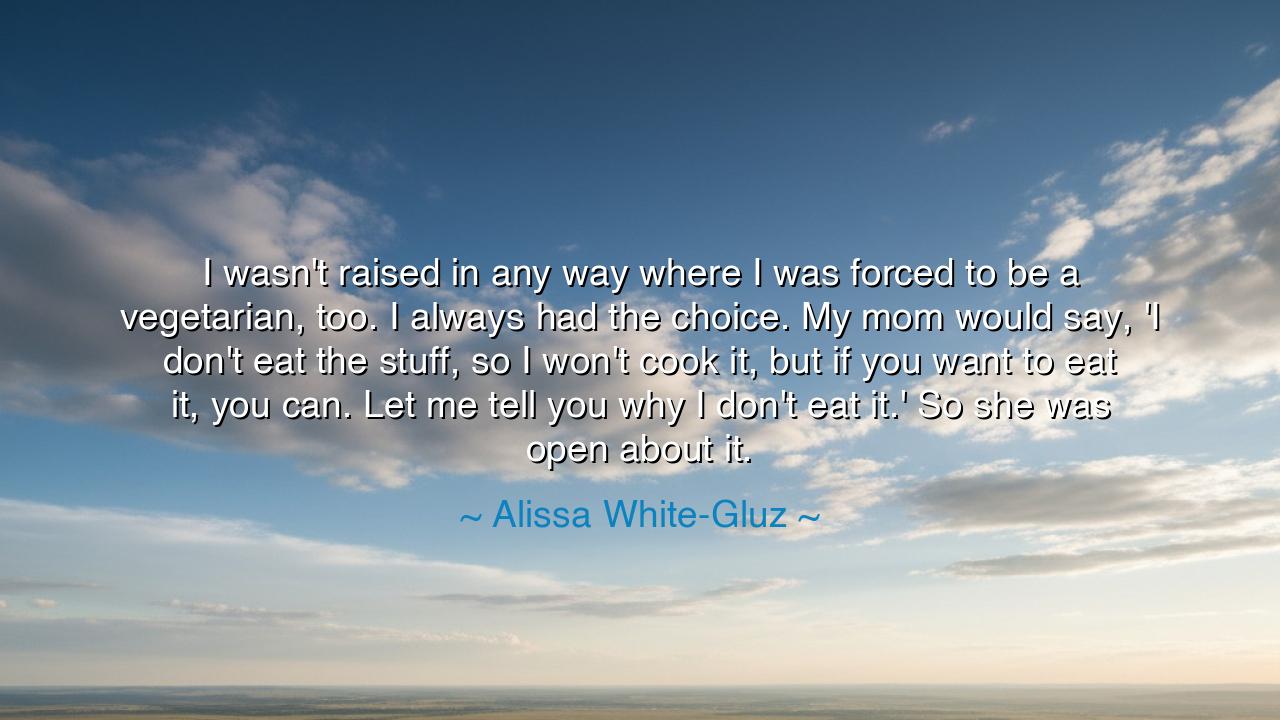
I wasn't raised in any way where I was forced to be a vegetarian
I wasn't raised in any way where I was forced to be a vegetarian, too. I always had the choice. My mom would say, 'I don't eat the stuff, so I won't cook it, but if you want to eat it, you can. Let me tell you why I don't eat it.' So she was open about it.






Hear the words of Alissa White-Gluz, who spoke with gratitude for the wisdom of her upbringing: “I wasn’t raised in any way where I was forced to be a vegetarian, too. I always had the choice. My mom would say, ‘I don’t eat the stuff, so I won’t cook it, but if you want to eat it, you can. Let me tell you why I don’t eat it.’ So she was open about it.” These words reveal more than a dietary decision—they reveal the timeless teaching of freedom, responsibility, and the power of example over compulsion.
The heart of this saying rests upon the sacred principle of choice. Many are raised under the weight of rules imposed without explanation, but Alissa’s mother offered her daughter not chains, but reasoning. She shared her own path and convictions, yet left her child free to walk her own. This is the essence of true teaching: to guide, but not to shackle; to inspire, but not to coerce. It is by freedom that conviction grows deep roots, for what is chosen willingly endures longer than what is forced.
The ancients knew well the value of such openness. Socrates did not command his students but questioned them, leading them toward truth by their own minds rather than by decree. Likewise, Buddha urged his followers not to believe his words blindly, but to test them in their own lives, to discover truth through lived experience. In both cases, as with Alissa’s mother, wisdom is passed not through force but through invitation. This way, the disciple becomes not a servant of authority but a seeker of understanding.
Her mother’s words, “Let me tell you why I don’t eat it,” show the noblest form of teaching: explanation rooted in honesty. This is the passing of knowledge through dialogue rather than command. The child is treated not as a vessel to be filled, but as a soul capable of reason. From this emerges not blind obedience, but respect. The daughter does not merely imitate; she listens, weighs, and decides. And in deciding, she becomes her own person, yet still honors her mother’s influence.
History itself offers many mirrors. Consider Marcus Aurelius, raised amidst emperors and generals, yet guided by his tutors with reason and example rather than tyranny. Their wisdom taught him to value moderation, justice, and reflection—not because he was forced, but because he saw their worth. When he later wrote his Meditations, it was clear: lessons given through freedom bear fruit in the soul far longer than lessons enforced by compulsion.
The lesson for us is simple, yet profound: if you would shape others—your children, your students, your companions—do so by offering them freedom and reasoning. Do not crush curiosity with commands, nor strangle individuality with force. Instead, share your convictions openly, live them with integrity, and allow others to see their beauty. For in freedom lies the birth of genuine conviction, and in openness lies the seed of lasting trust.
Practical wisdom calls to us: when guiding the young, explain the why as much as the what. Invite them to question, and respect their answers, even when they differ. Live your truth consistently, for example is the strongest teacher. And when confronted with the choices of others, meet them with dialogue, not judgment, remembering that wisdom forced is often rejected, but wisdom offered is remembered.
Thus the words of Alissa White-Gluz endure as more than memory of childhood: they are a call to teach with openness, to guide with choice, and to trust that truth, when lived sincerely, will inspire more deeply than any command. In this way, each generation passes not chains but wings to the next, allowing them to soar by conviction, not by compulsion.






AAdministratorAdministrator
Welcome, honored guests. Please leave a comment, we will respond soon